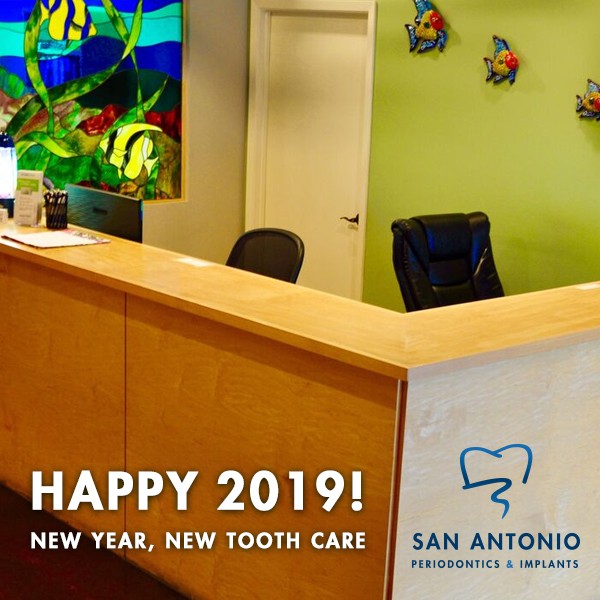
Periodontitis: Know the Risk Factors
Steven Maller
Most of us are sufficiently aware that plaque is a leading cause of gum disease. However, there are a multitude of other...
Read More
What is the Connection Between Periodontitis and Diabetes?
Steven Maller
Did you know that nearly 30 million Americans suffer from diabetes? Diabetes decreases the body’s ability to control the...
Read More
New Website
Steven Maller
San Antonio Periodontics & Implants has a new website to better serve the needs of our patients. The responsive website ...
Read More
Is Gum Disease More Common In Women
Steven Maller
Did you know that half of Americans have some form of periodontal disease [/periodontal-diseases/]? According to a CDC r...
Read More
Keeping Your Checkups up to Date
Steven Maller
We get it. Going to the periodontist isn’t your favorite thing to do. Between balancing work, family, school and so on,...
Read More
Medications & Your Teeth
Steven Maller
Many people don’t realize that medications, whether they are over-the-counter drugs or prescription treatments, can take...
Read More
What is Gingivitis?
Steven Maller
Gingivitis is a periodontal disease caused by the inflammation of the gums. There are two types of gingivitis: dental pl...
Read More
Dental Hygiene Travel Tips
Steven Maller
San Antonians are ready to come out of hibernation after a milestone winter where we actually enjoyed snow for the first...
Read More
Bad Breath: The Stealthiest Assault on Your Mouth
Steven Maller
We’ve all had an encounter with bad breath. You’re in class or at work, and somebody gets too close for comfort as they’...
Read More
Choosing a Dental Specialist
Steven Maller
Your teeth are an important part of you. Not only are they vital to your everyday functioning, allowing you to chew, tal...
Read More
New Year, New Tooth Care
Steven Maller
The New Year is upon us and we all know what that means. Lots of reflecting over the past year, fresh starts and New Yea...
Read More
Flossing vs. Water Flossing
Steven Maller
Flossing: the bane of human existence. We’ve all been there (aside from a few outliers who actually have their lives tog...
Read More
The All-On-4 Procedure Explained
Steven Maller
Pro football player and now television celebrity Michael Strahan sports a huge gap between his front teeth that has beco...
Read More
Guidelines to Help You Choose the Right Toothpaste
Steven Maller
Did you know that people have been brushing their teeth since 3500-3000 BC? History actually confirms that Babylonians a...
Read More
Caring For Dental Implants
Steven Maller
WHAT ARE DENTAL IMPLANTS? Before we get into how to care for dental implants [/specialty/dental-implants/], why don’t w...
Read More
When Periodontal Surgery is the Right Call
Steven Maller
Nobody really wants to hear that they need dental surgery. And when the surgery is associated with correcting things wit...
Read More
Have a Happy, Healthy Smile With Good Diet
Steven Maller
Today’s typical American diet carries much of the blame for tooth decay. Back in the 1930s, a Cleveland dentist undertoo...
Read More
Are Scaling and Root Planing Necessary For Me?
Steven Maller
Many people believe that dental work is painful, but with today’s technology and knowledge, beneficial dental work will ...
Read More
Start the School Year Off Right With Good Dental Habits
Steven Maller
Even though it seems like summer has just gotten started, the reality is that many children and teens will head back to ...
Read More
Why Should You Bother With Good Oral Hygiene?
Steven Maller
It seems like every day the public gets bombarded with tips and suggestions on how to be healthier. And sometimes, just ...
Read More
Dentures vs Dental Implants: Find Out the Pros and Cons of Both
Steven Maller
So, you’re missing some teeth. Despite the stigma surrounding this phenomenon, it is actually fairly common for adults t...
Read More
Halloween Treats Ranked from Spookiest to Healthiest for your Teeth
Steven Maller
It’s almost Halloween, and you’re probably geared up for all sorts of spooky stuff, like witches, goblins, ghosts and gh...
Read More
Connecting Gum Disease and Alzheimer’s
Steven Maller
Is there a link between gum disease and Alzheimer’s? Can taking care [/contact] of your gums and teeth also help protect...
Read More
Gum Disease: Five Warning Signs That You Need to See a Periodontist
Steven Maller
In today’s day and age of health and wellness, we tend to be more concerned about our mental and physical well-being, co...
Read More
How to Clean Your Dental Implants
Steven Maller
A large number of Americans are getting dental implants and that number is only growing with each year. While implants o...
Read More
What is All-On-4?
Steven Maller
Tooth loss is more common among adults than you might think; more than 35 million people in the United States are missin...
Read More
Gum Recession? Did You Know They Don’t Grow Back? Tips to Avoid Gum Recession
Steven Maller
Gum Recession is a bigger problem than most people think. A startling 88% of people age 65 and older have receding gums,...
Read More
How Long Do Dental Implants Last?
Steven Maller
This is a good question and one that you should investigate before making the sizable investment of dental implants [/sp...
Read More
How Gum Disease Affects Your Overall Health
Steven Maller
There are a lot of reasons to be on top of your oral health — and especially your gum health. The obvious reason is that...
Read More
How Orthodontics Affect Dental Implants
Steven Maller
Many people are choosing to undergo orthodontic work as adults, and a natural byproduct is that they are being given the...
Read More
Reasons to Replace a Missing Tooth
Steven Maller
Many people don’t want to admit — and therefore refuse to deal with — that they have a missing tooth or missing teeth. T...
Read More
Smiling Behind the Mask - Dental Implants and Your Mental Health
Steven Maller
There is nothing better than a pretty, healthy smile. It can boost your confidence, help your overall health and relieve...
Read More
Covid-19 and Gum Health
Steven Maller
It seems like the whole world has spent the last year dealing with the virus known as Covid-19. Some places are more fam...
Read More
Gum Disease In Men and Women
Steven Maller
According to the National Institutes of Health, more than 30 percent of the U.S. population is moderately or severely im...
Read More
5 Ways Poor Periodontal Health Will Cost You
Steven Maller
In recent years, dental emergencies have constituted around 2.1 million of the nation’s emergency room visits. Periodont...
Read More
Loose Teeth? Get Help Sooner Rather Than Later
Steven Maller
For many people, a problem in the mouth quickly becomes a source of stress, worry and sometimes pain. And that’s underst...
Read More
5 Ways to Combat Bad Breath
Steven Maller
If you’re a person who has a mouth and who has ever eaten a meal with garlic or onions, it’s likely that you’ve had bad ...
Read More
I Hate Flossing! Can I Skip It?
Steven Maller
If you hate flossing, you’re not alone. In fact, only 32% of Americans floss every day, and 1/3 of Americans don’t floss...
Read More
Periodontal Cleaning: Just as Important as Regular Cleanings
Steven Maller
Going to the dentist regularly for cleaning is crucial for oral health and helps prevent many problems associated with t...
Read More
Help Prevent Periodontal Disease with These Three Habits
Steven Maller
Periodontal disease can be prevented through many different methods. There are three habits specifically that anyone can...
Read More
Dental Implants: A Possible Solution For Missing Or Damaged Teeth
Steven Maller
For those with damaged or missing teeth, a dental implant [/specialty/dental-implants/] can be a positive solution. Howe...
Read More
Gum Grafts Can Restore Your Smile
Steven Maller
WHAT IS A GUM GRAFT? Gum grafts are a form of oral surgery where a periodontist typically takes soft tissue from the mo...
Read MoreVisit Our Office
San Antonio, TX
4501 McCullough Suite 104, San Antonio, TX 78212
Email: steven_maller@yahoo.com
Book NowOffice Hours
- MON - THU8:00 am - 4:00 pm
- FRI8:00 am - 12:00 pm
- SAT - SUNClosed


